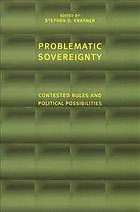Table Of ContentProblematic
Sovereignty
This page intentionally left blank
Problematic
Sovereignty
Contested Rules and Political Possibilities
STEPHEN D. KRASNER, EDITOR
ColumbiaUniversityPress newyork
ColumbiaUniversityPress
PublishersSince1893
NewYorkChichester,WestSussex
Copyright(cid:1)2001ColumbiaUniversityPress
Allrightsreserved.
LibraryofCongressCataloging-in-PublicationData
Problematicsovereignty/StephenD.Krasner,editor
p.cm.
Includesbibliographicalreferencesandindex.
ISBN0–231–12178-4(cloth:alk.paper)—ISBN0–231–12179–2
(pbk.:alk.paper)
1.Sovereignty.I.Krasner,StephenD.,1942–
KZ4041.P762000
327.1(cid:2)01--dc21
00-064426
(cid:1)
CaseboundeditionsofColumbiaUniversityPressbooks
areprintedonpermanentanddurableacid-freepaper.
PrintedintheUnitedStatesofAmerica
c 10 9 8 7 6 5 4 3 2 1
p 10 9 8 7 6 5 4 3 2 1
CONTENTS
StephenD.Krasner
Preface vii
AbouttheAuthors xi
StephenD.Krasner
1 ProblematicSovereignty 1
AbrahamD.SofaerandThomasC.Heller
2 Sovereignty:ThePractitioners’Perspective 24
JohnBoli
3 SovereigntyfromaWorldPolityPerspective 53
MichelOksenberg
4 TheIssueofSovereigntyintheAsian
HistoricalContext 83
JamesMcCallSmith
5 OneSovereign,TwoLegalSystems:ChinaandtheProblemof
CommitmentinHongKong 105
v
vi CONTENTS
RobertMadsen
6 TheStruggleforSovereigntyBetween
ChinaandTaiwan 141
MichaelMcFaul
7 TheSovereigntyScript:RedBookfor
RussianRevolutionaries 194
CoitBlackerandCondoleezzaRice
8 BelarusandtheFlightfromSovereignty 224
SusanL.Woodward
9 CompromisedSovereigntytoCreateSovereignty:IsDayton
BosniaaFutileExerciseoranEmergingModel? 252
ShibleyTelhami
10 TheRoadtoPalestinianSovereignty:ProblematicStructuresor
ConventionalObstacles? 301
StephenD.Krasner
11 ExplainingVariation:Defaults,Coercion,
Commitments 323
PREFACE
E
thnicwars,transnationalconcernsforhumanrights,theInter-
net, financialcrises,multinationalcorporations,international
trade,andmoregenerally,globalizationhavegivenrisetothesentimentthat
sovereigntyasithasbeenconventionallyunderstoodiserodingorevenwither-
ing away. This conclusion has been reached without much sense of the
extent to which the present is different from the past, and without much
systematicthoughtabouthowtheconceptofsovereigntymightbeunderstood
andhowtherulesofsovereigntyhaveactuallyfunctionedintheinternational
environment.
Many recent discussions about the status of sovereignty have addressed
economicquestions—especiallythepossiblelossofstateregulatorycapacity.
However, this volume addresses different and possibly more consequential
issues: namely, the way in which basic rules regarding mutual recognition
and the exclusion of external authority, what are termed in this study inter-
national legal sovereignty and Westphalian sovereignty, are influencing, fa-
cilitating, or impeding the resolution of difficult political and economic is-
sues.Therulesassociatedwithsovereignty,likeanysetofrules,maybemore
or less functional—more or less able to facilitate the realization of political,
economic, security, or ideologicalobjectivesthatarepursuedbyactors.The
conventional rules of sovereignty—that is, to recognize juridically indepen-
dent territorial entities and exclude external sources of authority from do-
mesticterritory—havebeenwidelyrecognizedatleastsincetheearlypartof
thenineteenthcentury.Theserules,whichoriginatedinEurope,havespread
vii
viii PREFACE
toallpartsoftheglobe,displacingotherinstitutionalformssuchastheChi-
nese tributary state system or the Moslem practice of dividing the world be-
tween Dar al-Islam, the House of Islam or the civilized world, and Dar al-
Harb,theHouseofWarinhabitedbyinfidels.Formanypurposessovereignty
ruleshavebeenattractiveandstabilizing.Theyhaveestablishedthepolitical
equivalentofpropertyrights.Theyhavefacilitatedtheconclusionoftreaties—
contractsamongstates.Theyhavemadeiteasiertodefinetransgressions.
The contemporary international environment is, however, complex. It
would be surprising if one set of rules were optimal for all situations. Prob-
lematic sovereignty refers not only to the violation of conventionalrulesbut
alsotothefactthatsuchrulesmightnotprovideactorswiththebestpossible
ways to realize their economic, political, and ideological objectives.China,
for instance, wants both juridical control over and internationalrecognition
forHongKong.ThemajorWesternpowerswantfullysovereignstatesinthe
Balkansbutareatthesametimepreparedtoviolatethedomesticautonomy
ofthosestatestoprotectandpromotetherightsofminorities.Theleadersof
Russia followed the script of sovereignty in supporting the breakup of the
SovietUnionbutwouldpreferthatatleastsomepartsoftheirformerhome-
landremain functionallysubordinateeveniftheyareformallyindependent.
TheleaderofBelaruswouldliketheoptionofbecomingtheleaderofsome
larger entity that would include Russia. Taiwan wants internationalrecogni-
tion but does not want to declare its formal independence fromChina.Pal-
estinians want a sovereign state but the Israelis will not accept a Palestinian
statethathasfullcontroloveritsownsecuritypolicies.
What happens in cases where the conventional rules of sovereignty do
notprovideoptimaloutcomes?Cantherulesbebent?Cantheyberewritten?
Can new rules be invented? These are the questions addressed in this vol-
ume.TheformerSovietUnion;partsofChinaincludingHongKong,Tibet,
and Taiwan; Bosnia; andPalestineallpresentsituationsinwhichtheinter-
ests of actors might be better served if they could find alternativestosover-
eignty.Insomecasessuchalternativeshavebeendeveloped.Inothersthey
have not.
Thefundamentalconclusionofthisstudyisthattherulesofsovereignty
are not absolutely constraining. They are not taken for granted. New rules
can be written; conventional ones can be ignored. Innovation is, however,
possible only if actors can reach voluntary agreements or if some powerful
statesarewillingtoengageincoercion.Absentcontractingorcoercion,con-
ventionalsovereigntyrulesarethedefault.
PREFACE ix
This project could not have been completed without the support of the
InstituteforInternationalStudiesatStanford.Theinstitute,likesomeofthe
casesinthisvolume,defiesconventionalrules.Itsactivitiesinvolveanumber
of different substantive issue areas and engage the worlds of both academia
andpublicpolicy.
Mywife,Patricia,inthis,asinallthings,hasbeenunfailinglylovingand
supportive despite my complaints aboutlostreferencesandothermorecon-
sequentialissues.
StephenD.Krasner
Stanford,California

